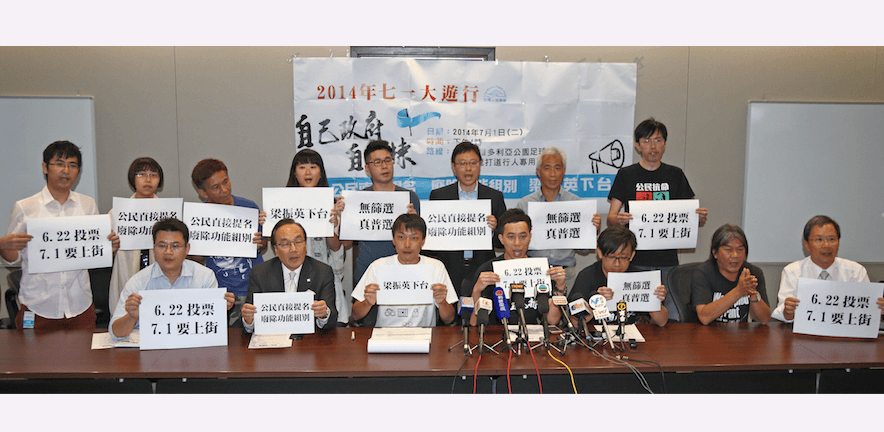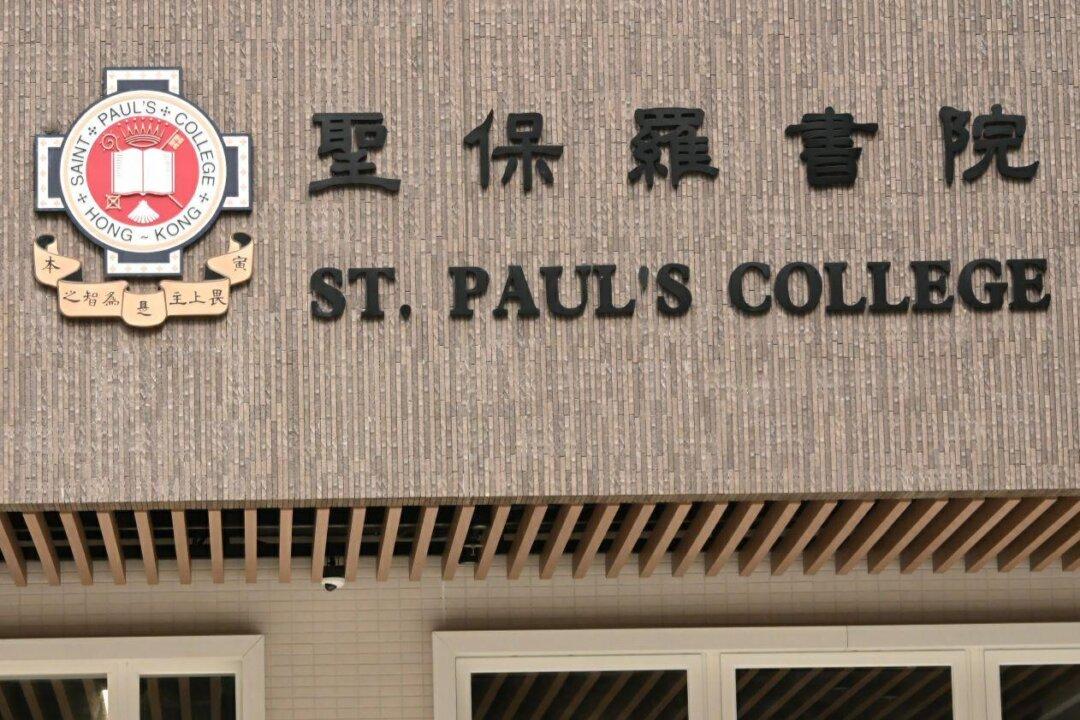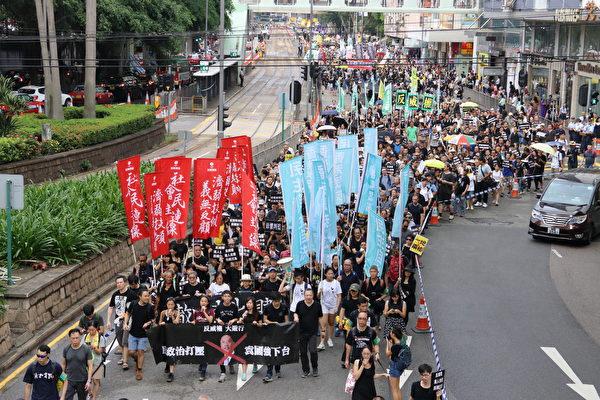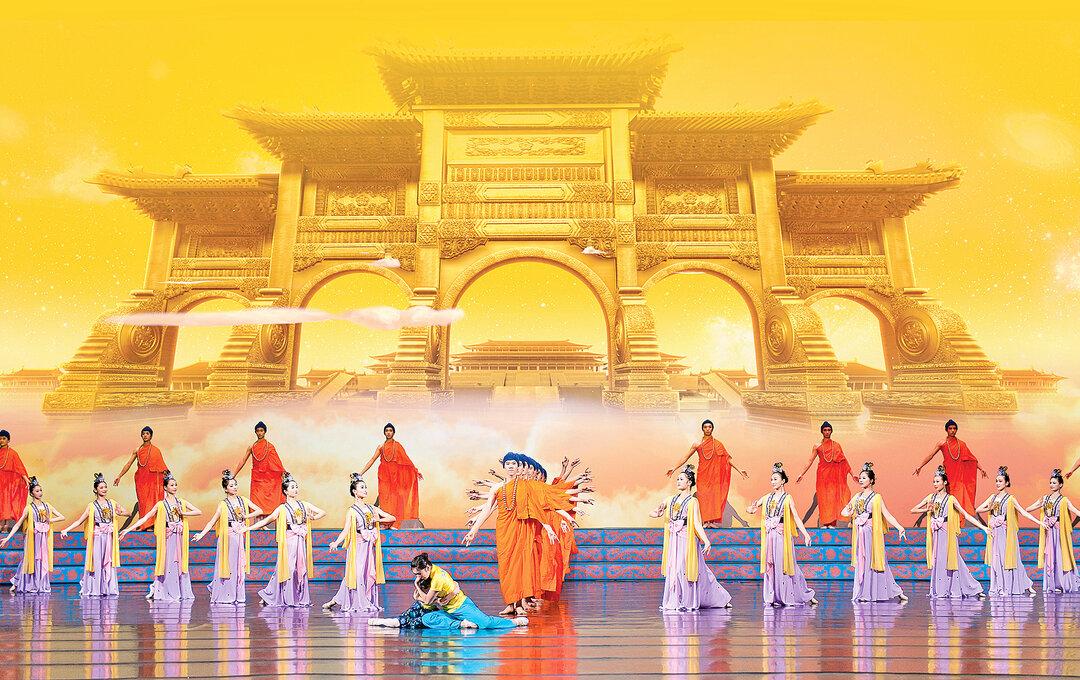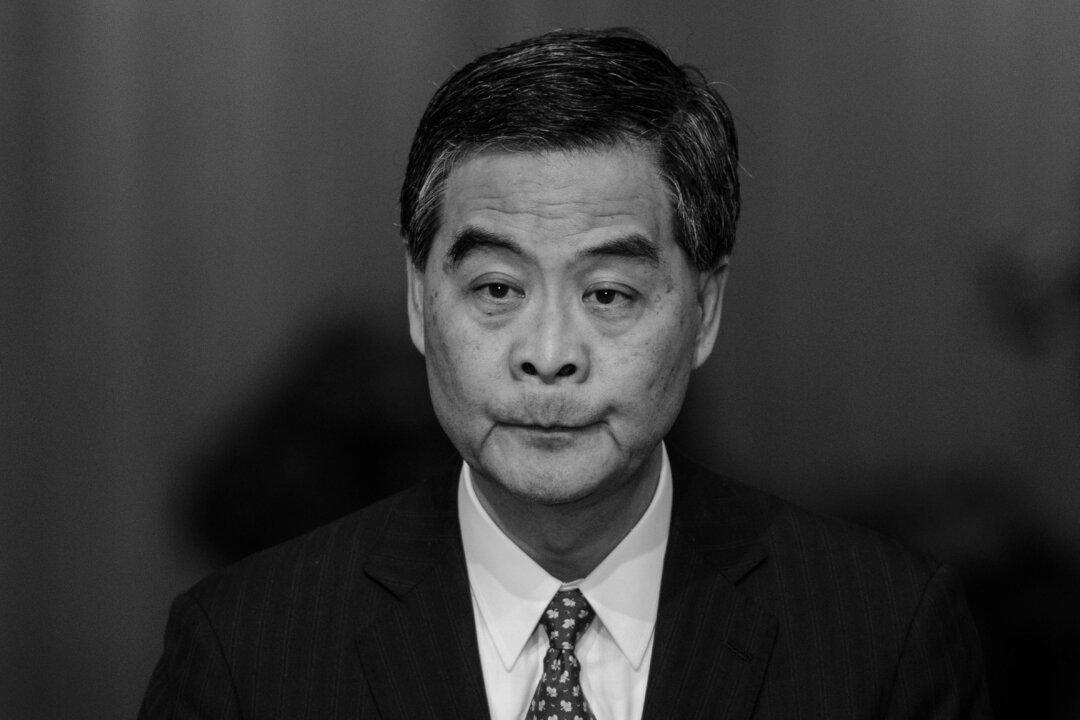HONG KONG—During this year’s annual July 1 march, Hong Kongers plan to call for an end to the Chinese regime’s control over their government.
The theme of the rally, which will take place in Victoria Park, is that citizens should be allowed to nominate their government directly, that functional constituencies should be abolished, and that Chief Executive Leung Chun-ying should step down. Functional constituencies organize the electorate according to professions and are a means of indirect election that has in the past been dominated by Beijing.
The convener, Johnson Yeung Ching-yin, said that Hong Kong society has lost its confidence in Leung and his government, so they are collecting power to prepare for civil disobedience so the society can choose their own government.
Over 400,000 people joined last year’s protest, which also targeted Leung and the Communist regime that supports him. The Civil Human Rights Front (CHRF) believes there will be more participants this time, since this year’s political atmosphere has caused greater public discontent.
The CHRF said the initial application for the event consists of 100,000 people, more than twice that of last year. They added that there is momentum from this year’s June 4 candlelight vigil in Hong Kong, which had a record-breaking attendance of more than 180,000 people who gathered in remembrance of the Tiananmen Square Massacre in 1989.
The annual July 1 marches began in 1997 on the day that the British colony of Hong Kong was handed over to the People’s Republic of China, and had a pro-democracy theme, which has continued in the subsequent annual protests.
This year’s July 1 parade will depart at 4pm instead of 3pm as it did in the past, both because of the hot weather and to encourage more people to attend the rally after the march, according to the CHRF. The march will end at Charter Road Pedestrian Precinct, where protesters will hold the public rally.
Yeung said that the Chinese Communist Party (CCP) has increased the suppression of Hong Kong’s freedom, including press freedom, over the past year in order to control political reform results.
“The freedom of expression is gradually being controlled, and the media has become a tool to brainwash citizens into becoming obedient,” Yeung said.
Yeung said the CCP has continuously denied nominations by citizens and political parties, forcing Hong Kong citizens to accept a committee nominated by small groups. He added that police authority has been abused, and the police have been used as a tool to suppress the freedom of demonstration.
Occupy Central Movement
Hong Kong citizens are also planning Occupy Central, a nonviolent protest in July calling for universal suffrage in Hong Kong.
The CHRF and the Hong Kong Federation of Students have stated that Occupy Central could take place earlier than expected, depending on how the government responds to the movement’s online referendum to be held June 20–22 calling for democratic elections and universal suffrage in the election for the Hong Kong chief executive in 2017.
“If Leung’s government doesn’t give the public a response after the June 22 referendum, the Hong Kong Federation of Students will certainly speak up,” said External Affairs Secretary Alex Chow Yong-kang. “Through this movement, we Hong Kong people want democracy, and the power of solidarity with the Hong Kong people will come from various places.”
Chow urged Leung’s government to pull back before it’s too late and respond to the people’s demand for true universal suffrage. However, he does not have high expectations of Leung.
“We do not have faith or confidence in someone who can betray his own past. We also believe that civil disobedience and the occupation of Central is unavoidable,” Chow said.
Among those leading this year’s parade will be former Commercial Radio Hong Kong host Li Wei-ling and former Asia regional director of Value Partners Consulting Ng Pui-ying, who exposed the government’s rigging of Hong Kong’s television licensing. The parade organizers are choosing individuals of different levels of status to lead the parade in order to indicate that all parts of Hong Kong society support the demand for democracy.
The song “Do You Hear the People Sing” from the musical Les Misérables has been adapted and rewritten as “Who Hasn’t Spoken Out” and mass circulated on the Internet. The CHRF uses the lyrics “Who wants to resign to silence? For future generations, we need to open our eyes in time.”
Civic Party leader Alan Leong Kah-kit said, “After CY Leung took office, Hong Kong has become more and more foreign. His appointed officials, legal framework, and advisory bodies have all been inbreeded.”
“We can see that he is only trying to disintegrate Hong Kong,” Leong said. “As for anyone who still has hope in Hong Kong, who still hopes that Hong Kong can be a place of settlement, I hope that you can first use your hands on June 22 and then your feet on July 1 to speak up. We will not ignore or abandon the changing Hong Kong.”
Anti-Communist Sentiments Rise
According to Civic Party member Chan Ka-lok, the Tiananmen Square massacre 25 years ago triggered the change in the communist regimes in Eastern Europe, with the Polish Communist Party the first domino to fall. Chan believes that the momentum from this year’s June 4 rally will put pressure on the CCP.
“It will extend to the public referendum on June 22 as well as the parade and rally on July 1,” Chan said, adding that as long as the spirit of truth and justice is upheld, the strength of Hong Kong citizens will eventually win.
Many pan-democrats have urged the public to continue with the momentum achieved at the June 4 rally, encouraging them to actively participate in the July 1 protest and the June 22 referendum.
League of Social Democrats member Leung Kwok-hung urges youth to join the anti-Communist ranks.
“The Communist Party has a lot of problems,” he said. “As we have seen more and more young people participating at the June 4 rally, they should come out and express their opinions.”
With the CCP’s political instability, there are new rumors that Leung, who is supported by the Jiang Zemin faction of the CCP, may lose his position.
The Communist Party’s leadership has been openly divided, with rumors that former leader Jiang Zemin and his supporters are being suppressed. Jiang faction supporters in Hong Kong have been called for investigation, and Epoch Times has reported that Zeng Qinghong, the Party official who placed those supporters in Hong Kong, is under control.
Leung left Hong Kong from May 30 to June 2, saying he had a personal reason that was “inconvenient to disclose.”
In a June 3 article for the Hong Kong Economic Journal, political commentator Lin Yuet-tsang questioned Leung’s mysterious disappearance. He suggested that it involved dealing with his relationship with Jiang’s faction, and that the faction may have asked Leung to explain and help them investigate the issues with their supporters in Hong Kong.
Since the last July 1 protest, Leung has been accused of increased suppression of the media and disintegration of Hong Kong’s liberties, which has provoked even greater public discontent and resentment.
Translated by Veronica Wong. Written in English by Sally Appert.
